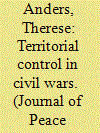| Srl | Item |
| 1 |
ID:
185676


|
|
|
|
|
| Summary/Abstract |
Gross domestic product (GDP), GDP per capita, and population are central to the study of politics and economics broadly, and conflict processes in particular. Despite the prominence of these variables in empirical research, existing data lack historical coverage and are assumed to be measured without error. We develop a latent variable modeling framework that expands data coverage (1500 AD–2018 AD) and, by making use of multiple indicators for each variable, provides a principled framework to estimate uncertainty for values for all country-year variables relative to one another. Expanded temporal coverage of estimates provides new insights about the relationship between development and democracy, conflict, repression, and health. We also demonstrate how to incorporate uncertainty in observational models. Results show that the relationship between repression and development is weaker than models that do not incorporate uncertainty suggest. Future extensions of the latent variable model can address other forms of systematic measurement error with new data, new measurement theory, or both.
|
|
|
|
|
|
|
|
|
|
|
|
|
|
|
|
| 2 |
ID:
176040


|
|
|
|
|
| Summary/Abstract |
Territorial control is a central variable for civil war research – yet, we lack sufficiently detailed data to capture subnational dynamics and offer cross-country coverage. This article advances a new measurement strategy for territorial control in asymmetric civil wars. Territorial control is conceptualized as an unobserved latent variable that can be estimated via observed variation in rebel tactics. The strategy builds on a theoretical model of rebel tactics, by which rebels use terrorism less when they control a given area – preferring conventional tactics, which require higher levels of territorial control. The latent variable, territorial control, is estimated via a Hidden Markov Model (HMM). As an observable indicator for rebel tactics, I leverage geo-coded event data and a function of the relative frequency of terrorist attacks and conventional war acts, weighted by time and distance. The model yields estimates of territorial control for asymmetric civil wars at a resolution of 0.25 decimal degree minimum diameter hexagonal grid cells. Validation of estimates for the Colombian and Nigerian civil wars suggests HMMs as a fruitful avenue to estimate spatiotemporal variation in territorial control.
|
|
|
|
|
|
|
|
|
|
|
|
|
|
|
|